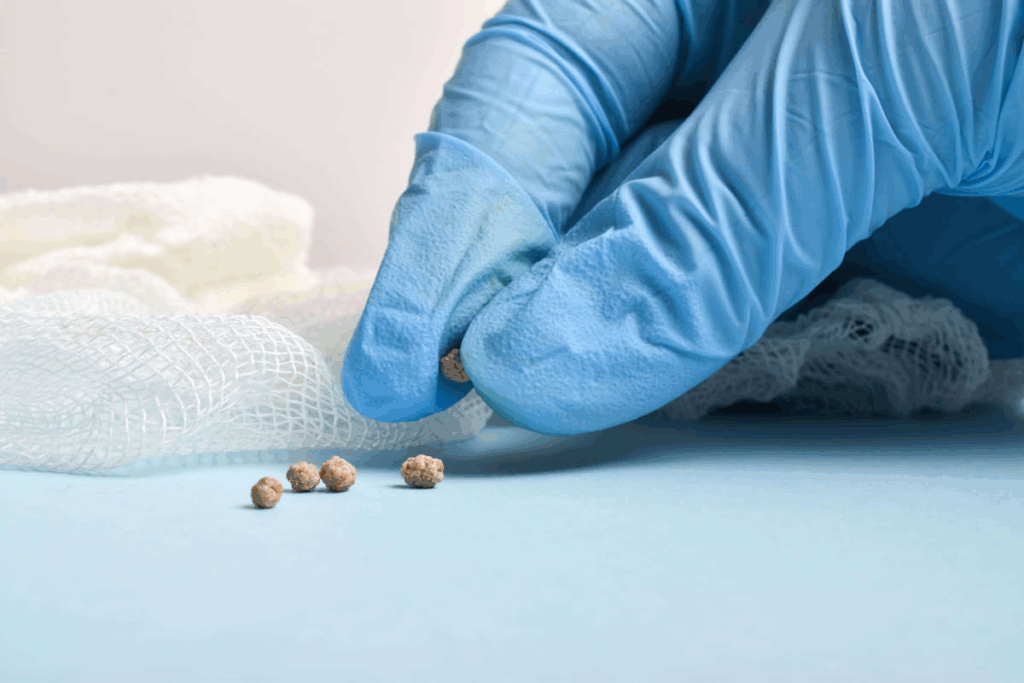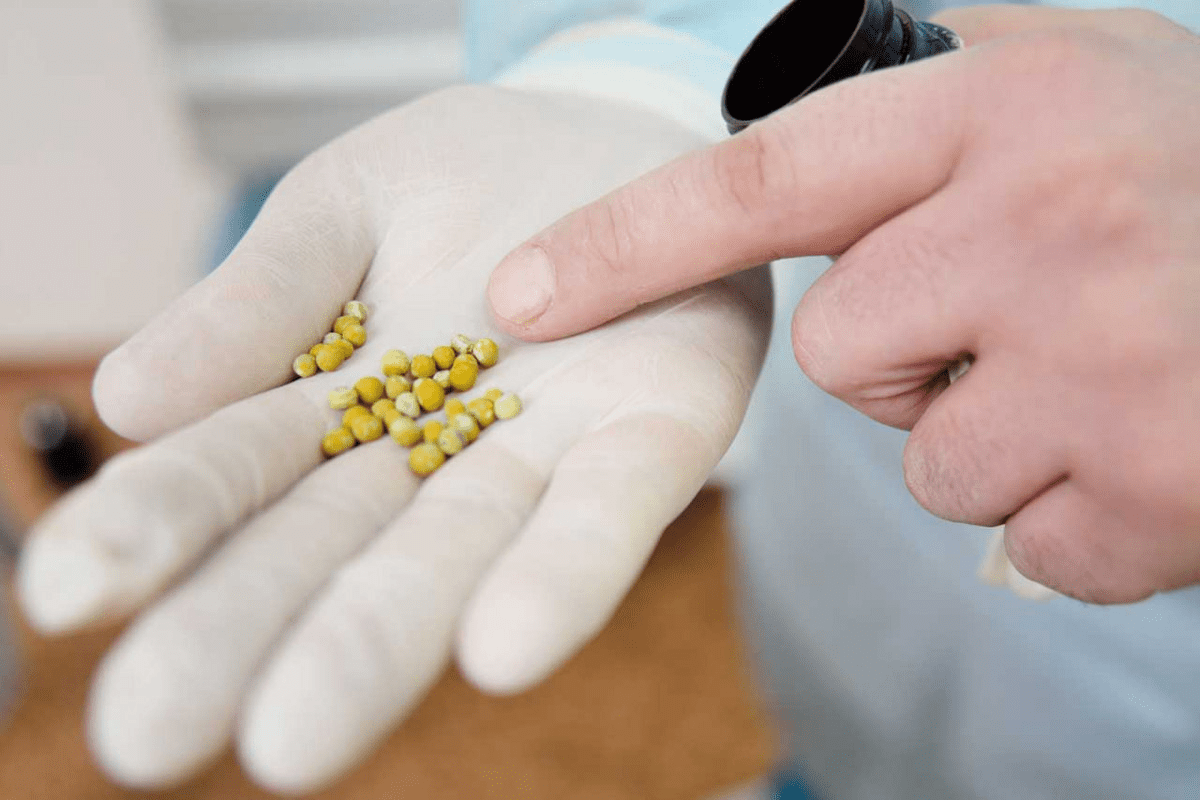
Urinary tract stones can form in different parts of the urinary system. This leads to distinct conditions that need accurate diagnosis and treatment. Kidney stones and bladder stones are two such conditions. They differ significantly in their location and how they present clinically.
What is the difference between kidney stones and bladder stones? Compare the causes, symptoms, and treatment locations for both.
At Liv Hospital, we know how important it is to tell these conditions apart. Our team is committed to giving you the best care. We focus on a detailed, patient-centered approach to evaluation and treatment.
It’s key to understand the differences between kidney stones and bladder stones. This helps in recognizing symptoms early and getting the right medical care. We’ll dive into these differences, covering how they form, their symptoms, and treatment options for each.

Urinary tract stones are hard mineral deposits that form inside the urinary system. This system includes the kidneys, ureters, bladder, and urethra. It helps remove waste and excess fluids from the body.
There are several types of stones, including calcium stones, uric acid stones, struvite stones, and cystine stones. Each type has different risk factors and is associated with different conditions.
Understanding how stones form and the types is key for prevention and treatment. Knowing the risk factors and taking preventive steps can help lower the chance of getting urinary tract stones.
Kidney stones are hard deposits that form inside the kidneys. They happen when there’s an imbalance of water, salts, and other substances. The main types are calcium stones, uric acid stones, struvite stones, and cystine stones.
Different types of kidney stones have different causes. Calcium stones are the most common. They often happen when there’s too much calcium in the urine. Uric acid stones are more likely in people who eat a lot of meat, seafood, and sweets.
Staying hydrated is key to preventing kidney stones. Drinking lots of water helps dilute the urine. This reduces the concentration of minerals that can form stones.

Bladder stones are hard masses made of minerals that form in the bladder. They often happen because the bladder doesn’t empty fully. This can be due to many reasons.
Several things can make you more likely to get bladder stones. These include your age, sex, and some health conditions. Men are more at risk than women.
Symptoms of bladder stones include pain, trouble starting or stopping urine flow, and painful urination. Treatment depends on the stone’s size and location. It might include surgery, lithotripsy, or medicine.
Knowing about bladder stones’ causes and symptoms helps prevent and treat them.
Kidney stones and bladder stones are two types of urinary tract stones. They have different ways of forming, symptoms, and treatments.
Kidney stones form in the kidneys. They can be caused by genetics, diet, and environment. Bladder stones, on the other hand, form in the bladder.
The symptoms of kidney stones and bladder stones differ. Kidney stones can cause sharp pain in the back or flank. Bladder stones lead to painful urination and needing to urinate often.
The treatment for kidney stones and bladder stones varies. It depends on where they are and how severe the symptoms are. Knowing these differences is key to managing them effectively.
Understanding the unique traits of kidney stones and bladder stones helps. It allows people to get the right medical care and treatment.
Kidney stones can cause a range of symptoms, from mild to severe. The pain is often sharp and stabbing. It can be felt in the lower back, abdomen, or groin area.
Common symptoms include severe pain, nausea, vomiting, and changes in urination. If you are experiencing any of these symptoms, it is vital to seek medical attention. This will help determine the cause and ensure you receive the right treatment.
Bladder stones can cause a lot of discomfort and pain. If you have lower abdominal pain, painful urination, or need to urinate often, you should see a doctor. Getting medical help early can stop more problems and make you feel better.
Diagnosing urinary stones requires a few steps. First, a doctor will ask about your medical history. Then, they will do a physical exam. They might also use imaging studies to help find the stones.
A doctor will check for pain or tenderness in your flank or abdomen. They will also ask about your medical history. This helps them understand if you’re at risk for stones or if you’ve had them before.
To find urinary stones, doctors use a few methods. Non-contrast CT scans, ultrasound, and X-rays are common. These tools help doctors see the stones clearly.
The treatment for kidney stones varies. It depends on the stone’s size, location, and how many there are.
Managing pain is key when dealing with kidney stones. You can use over-the-counter pain meds like NSAIDs. They help reduce the pain.
Alpha-blockers can also help. They relax the muscles in the ureter. This makes it easier for the stones to move out.
At times, surgery is needed. This might include shock wave lithotripsy. Or other methods to remove the stone.
Treating bladder stones needs a detailed plan. This plan looks at the stone’s size, the patient’s health, and how bad the symptoms are.
Small stones might just need pain relief and staying hydrated. But bigger stones often need more serious treatments.
Medicines can help manage symptoms and sometimes break down the stones. For large or painful stones, surgery like transurethral resection might be needed.
It’s important to follow up after treatment. This makes sure the treatment works and fixes any problems quickly.
To prevent urinary stones, like bladder and kidney stones, we need to make lifestyle changes and use medical treatments. Drinking plenty of water is key to stop stones from forming in the kidneys and bladder.
Eating a balanced diet is also important. Try to eat less of foods high in oxalate, sodium, and animal protein. This can lower your chance of getting stones.
It’s vital to see a doctor quickly if you have urinary symptoms. Knowing the causes, symptoms, and treatments for these stones helps us stay healthy.
By following these prevention tips, we can lower our risk of getting kidney and bladder stones. This helps us stay healthy and enjoy a better quality of life.
Bladder stones form in the bladder, while kidney stones form in the kidneys. Both can cause pain and discomfort, but their locations and treatments are different.
Symptoms of kidney stones include severe pain in the side or back. You might also feel nausea, vomiting, and have trouble urinating.
Bladder stones can be treated with surgery, medication, or both. The treatment depends on the stone’s size and location.
Risk factors for kidney stones include a family history and dehydration. Certain medical conditions and some medications also increase the risk.
While some risk factors can’t be prevented, a healthy lifestyle helps. Staying hydrated and managing medical conditions can reduce the risk.
Kidney stones are usually diagnosed with imaging tests like X-rays, CT scans, or ultrasounds.
A kidney stone forms in the kidney, while a bladder stone forms in the bladder. Kidney stones can move down into the bladder, causing severe pain.
Symptoms of bladder stones include painful urination and frequent urination. You might also feel abdominal pain.
Bladder stones can be treated with surgery, medication, or both.
Untreated kidney stones can lead to infection and damage to the kidneys. They can also cause other complications.
While some risk factors can’t be prevented, a healthy lifestyle helps. Staying hydrated and managing medical conditions can reduce the risk.
If you have severe pain, difficulty urinating, or other symptoms, see a doctor. They can diagnose and treat you properly.
Some home remedies may help relieve symptoms, but it’s important to see a doctor for proper diagnosis and treatment.
In some cases, yes, passing a small kidney stone on your own is possible. But larger stones may need medical help.
Recovery time varies depending on the type of treatment and individual factors.
Maintaining a healthy lifestyle, staying hydrated, and managing medical conditions can help prevent bladder stones from recurring.
Kidney and Bladder Stones – https://www.radiologyinfo.org/en/info/stones-renal
Subscribe to our e-newsletter to stay informed about the latest innovations in the world of health and exclusive offers!
WhatsApp us